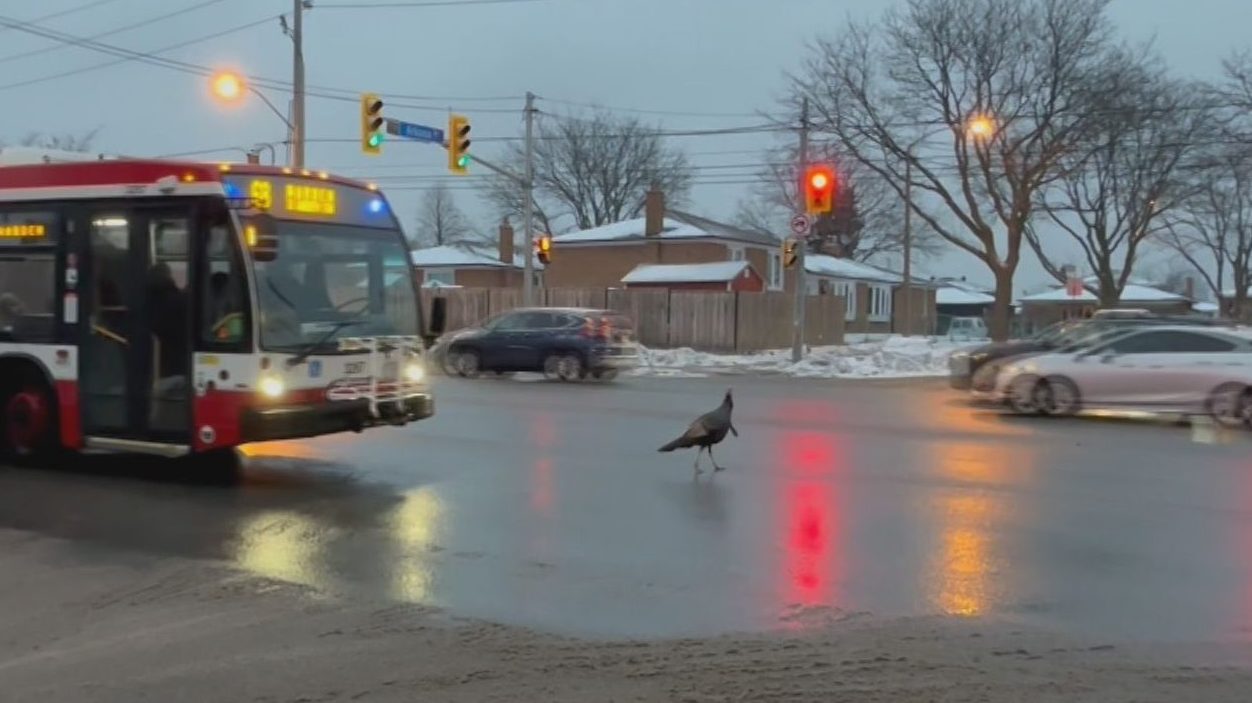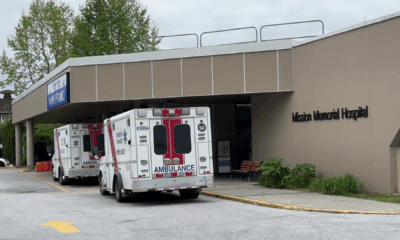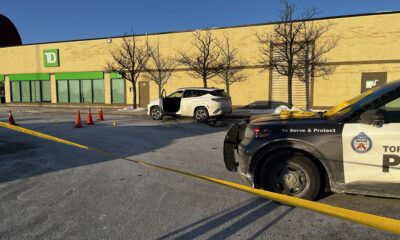Local News
Wild turkey roaming on Scarborough roads for 2 months saved by Toronto wildlife crew

A wild turkey that has been roaming in heavy traffic and leaping on and off homes in a Scarborough neighbourhood for two months has been saved by Toronto Wildlife Centre (TWC) rescuers.
The rescue came nearly a day after the massive bird after Toronto police officers issued a traffic bulletin urging drivers to use caution while driving on Warden Avenue just north of Highway 401.
“They knocked on the door, and they said, ‘Oh, we got the bird, and we’re going to relocate it somewhere where it’s safe,” a resident named Sam told The Leader Spirit on Tuesday.
“You see the footprints all over. You know it pecks at people’s cars, pecks at the windows, makes a bit of a mess everywhere … I mean you’re concerned for its safety too.”
Sam said he called 311 Toronto in the past to report the wandering bird.
“It was causing quite a bit of an issue with traffic. People were swerving to avoid it. It was going to cause an accident,” he said.
“It seemed the animal had to be injured or a serious event had to happen before anything was done about it.”
The massive turkey was found at Sam’s pickup truck Tuesday morning by Andrew Wight and his colleague Darlene at the TWC along with Toronto police officers.
“We’ve known about this turkey for some time, but every time we made our way out the turkey was gone or in an inaccessible spot,” Wight said, noting Tuesday’s visit was the third attempt to capture the bird.
“Normally we wouldn’t go get and get a turkey that’s kind of living its life, but because of the scenarios it was getting into we were concerned for its safety as well as public safety.”
Wight said past attempts to save the bird were unsuccessful due, in part, to faulty location information and the roaming nature of the turkey. He noted any visit after dark is difficult because turkeys go up into trees.
When Wight and his colleague arrived in the area after the TWC received another call on its emergency tip line, he said the turkey was staying close to a police car in the area trying to keep it off the road.
“The turkey was immediately on edge … I was kind of like, ‘Oh boy, here we go,’ and it looked like he was running toward Warden again,” he said, noting it went to the truck.
“I see his legs running full speed between this little corridor. Basically I had my net and when he came out and turned the corner, I just dove on him with my net. I was able to crawl over and hold him down because they are super powerful, strong animals.”
Wight said they covered the turkey with a sheet because “that keeps all wildlife relatively calm in a situation when they’re in a scenario that’s scary for them.”
“The community started coming out going, ‘Is that the turkey? Did you catch the turkey?’” he recalled.
Nathalie Karvonen heads up the charitable wildlife welfare and rescue organization. She said the turkey was taken to the TWC for a health assessment. She said it didn’t appear there were any physical health issues.
Karvonen said they received reports residents in the area may have been feeding the turkey from their vehicles, which is why it was comfortable on local roads.
“Wild turkeys don’t act like this unless they’ve been trained to come around people, they’ve been rewarded to come around people, ” she told The Leader Spirit, noting her staff and volunteers typically respond to one or two incidents involving turkeys annually.
“(Feeding wildlife) changes the behaviour of the wild animal and that does put them in peril quite often.”
The Leader Spirit visited the area Monday afternoon after the Toronto police warning was shared on social media. The wild turkey was spotted weaving in and out of traffic, pecking at vehicles and narrowly avoiding being hit for a couple of hours. At times residents went on the road in an unsuccessful attempt to corral the turkey. It briefly went to a nearby home’s roof before going back into traffic and flying into a tree to nest for the evening.
The turkey was captured on Ontario government traffic cameras on the Warden Avenue off-ramp to Highway 401 in early December. Since then, The Leader Spirit received occasional reports from traffic spotters the bird was still creating issues for drivers.
A Toronto police spokesperson initially said in a social media post that “Toronto Wildlife was notified about the incident.” When asked for an update on the situation Monday evening, The Leader Spirit was referred to the City of Toronto’s 311 line. A 311 representative said they checked with Toronto Animal Services and noted they received other calls. However, they advised City staff weren’t coming.
“Toronto’s urban wildlife is incredibly diverse, with thousands of unique species calling this city home… Toronto Animal Services responds to calls about sick and injured wildlife and works with Toronto Police Service and the Toronto Wildlife Centre to address issues of public safety involving wildlife,” a City of Toronto media spokesperson told The Leader Spirit in a written statement when asked about Monday’s situation.
The Leader Spirit also contacted the Ontario Ministry of Natural Resources and Forestry (MNRF), which has responded to other instances outside of Toronto for problematic incidents involving wildlife.
“Municipalities are responsible for deciding on and taking appropriate actions when human-wildlife encounters create ongoing conflict situations on municipal property, and can also take action on private property with the permission of the landowner,” a statement Tuesday afternoon said.
“To date, the MNRF has not been contacted regarding this matter.”
“Any situation that impacts public safety should be referred to the local police since they have the authority to deal with these matters. Police can dispatch the animal if they decide it is necessary to protect public safety.”
The Leader Spirit contacted the Toronto Police Service for comment on Tuesday about the ongoing road safety issues, but a response wasn’t received as of Tuesday evening.
When it comes to the safety issues associated with roaming wildlife, The Leader Spirit asked personal injury lawyer Nainesh Kotak about potential, general liability issues. He said drivers are usually deemed not at fault if an animal runs in front of a vehicle last minute.
“I think drivers need to remember that their foremost duty of care when operating a vehicle on the road is to their passengers and to other users of the road, other human users of the road. They don’t have that duty of care to the wild turkey,” he said, noting generally the legal reality for wildlife is a sad one if it’s unsafe to stop in time.
“Let’s assume there’s nobody else around you and you could avoid [a dead animal], then you do so because if you run over that. That could be deemed at fault. But if there’s traffic around you, you’ve got to run over that turkey and happy Thanksgiving. I mean you cannot put human life or property in jeopardy in those circumstances.”
Kotak also cautioned people about stopping and going on the road to try to intervene.
“We all want to be altruistic … you could yourself get hurt and have contributory negligence put on yourself if you decide to sue anyone who hits you, so obviously you need to be very careful when getting out of the vehicle in any circumstance,” he said.
As for if there are legal implications for a lack of government response to known issues, Kotak said it needs to be examined if there’s a policy to not corral wildlife or if it’s an operational decision because of a lack of resources.
“If it was an operational decision, there’s a chance of liability on a municipality or the province if it was reasonably foreseeable that someone could be injured as a result of these obstructions that are happening on the road by turkeys or other animals,” he said.
“If it’s just simply a policy resource decision, I think it would be very difficult to be successful in such a lawsuit in those circumstances.
“The most important thing is, drivers, you have to drive carefully irrespective of animals being on the road and there’s significant insurance ramifications as well.”
Meanwhile, Karvonen said they’re looking at options to relocate the turkey to a better and safer environment.
HAZARD:
Warden Ave & Cloverleaf Gate
3:49pm
– reports of wild turkey on the road
– Toronto Wildlife has been notified
– use caution when driving in the area#GO163841
^se— Toronto Police Operations (@TPSOperations) January 22, 2024
Welcome to #Toronto. There’s a wild turkey just chilling on Warden Avenue in the middle of the intersection. @TPSOperations says a wildlife crew has been dispatched. #ScarbTO pic.twitter.com/zlrBKj8Nsc
— Nick Westoll (@NWestoll) January 22, 2024
This turkey definitely doesn’t like larger vehicles. It was pecking pretty hard at this snow plow. pic.twitter.com/j8RPb5n04H
— Nick Westoll (@NWestoll) January 22, 2024
People keep stopping to try to corral it in the middle of Warden Avenue without luck. It has retreated back into the neighbourhood again. pic.twitter.com/12cr5lUeA5
— Nick Westoll (@NWestoll) January 22, 2024
Watch out for a Turkey on the Warden ramp to the WB 401. The bird is pacing back and forth and some callers have reported it walking up to the cars. MTO have been notified. pic.twitter.com/idw8SVC6FV
— The Leader Spirit Toronto Traffic & Weather (@citynews680) December 7, 2023












